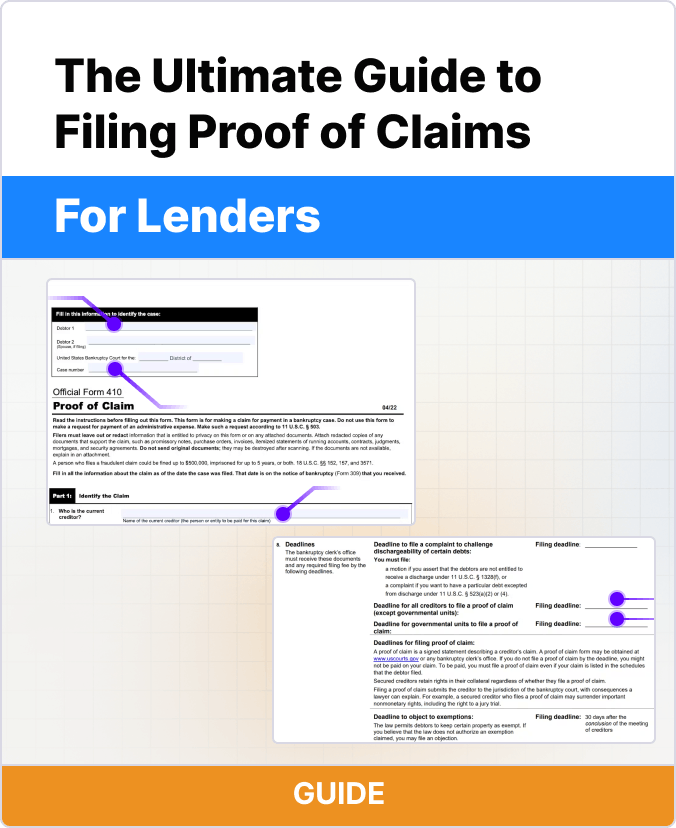In previous articles, we've provided comprehensive resources to make it easy to file a Proof of Claim. If you haven't already, make sure to check out our previously published Proof of Claim resources:
- Read about how to file a Proof of Claim in our article "The Ultimate Guide to Filing a Bankruptcy Proof of Claim"
- Read about each section of the Proof of Claim in our article "The Bankruptcy Proof of Claim (with Pictures)"
- Read about the 5 most common Proof of Claim mistakes in our article "5 Mistakes Creditors Make Filing Claims"
- Test your comprehension of the basics for filing a Proof of Claim. Take our 10-minute quiz to gauge your knowledge and get feedback on areas to improve.
- File a Proof of Claim effortlessly with our universal form. Sign up and begin at no cost.
In this article, we want to provide more insight into issues that can arise from Proofs of Claim. Here are 5 additional issues related to Proofs of Claim:
1. Can a proof of claim be filed late?
Usually, the answer is no. Fed. R. Bankr. P. 3002(c) states: “In a voluntary chapter 7 case, chapter 12 case, or chapter 13 case, a proof of claim is timely filed if it is filed not later than 70 days after the order for relief under that chapter or the date of the order of conversion to a case under chapter 12 or 13.”
However, there are some limited exceptions. These exceptions are summarized as follows.
- Governmental Units (3002(c)(1)): A governmental unit has 180 days from the date of the order for relief to file a proof of claim.
- Infant or Incompetent Person (3002(c)(2)): If a creditor is an infant or incompetent person or their guardian/conservator, the court may extend the time.
- Judgments on Unsecured Claims. (3002(c)(3)): An unsecured claim which arises in favor of an entity or becomes allowable as a result of a judgment may be filed within 30 days after the judgment becomes final if the judgment is for the recovery of money or property from that entity or denies or avoids the entity's interest in property.
- Claims Arising from Rejection of an Executory Contract or Unexpired Lease (3002(c)(4)): A claim arising from the rejection of an executory contract or unexpired lease is due within a specified time set by the court.
- Notice of Dividend (3002(c)(5)): If the trustee reverses a prior determination of no assets and then indicates a dividend is possible, then a creditor will have at least 90 days to file a proof of claim.
- On Motion to Extend Deadline (3002(c)(6)): On motion filed by a creditor before or after the expiration of the time to file a proof of claim, the court may extend the time by not more than 60 days from the date of the order granting the motion. The motion may be granted if the court finds that the notice was insufficient under the circumstances to give the creditor a reasonable time to file a proof of claim.
- Chapter 13 Cases; Secured Claims On Principal Residence (3002(c)(7)): In a Chapter 13 case, if a claim is secured by the debtor's principal residence, a creditor must file the proof of claim within with the attachments required by Rule 3001(c)(2)(C) within the 70 day deadline. However, the attachments required by Rule 3001(c)(1) and (d), filed as a supplement to the claim, are due not later than 120 days after the order for relief is entered.
Courts have generally held that no other extensions of time (other than the exceptions above) can be granted to file the claim. Further, courts have also indicated that the excusable neglect standard in Fed. R. Bankr. P 9006(b) does not permit an extension of time.
2. Who has the burden of proof in a claim objection proceeding?
The debtor has the initial burden of proof to demonstrate why the claim should be disallowed. This is because Fed. R. Bankr. P. 3001(f) states that a properly filed proof of claim constitutes prima facie evidence of the validity and amount of the claim.
If the debtor meets that burden, then it shifts to the creditor.
The evidentiary standard is usually by the preponderance of the evidence.
Note, if the creditor’s claim is not properly filed (meaning it meets all the requirements for a proof of claim including attachments etc.) then there is no prima facie validity and the creditor will bear the initial burden.
3. Can another document be construed as an informal proof of claim?
Yes, in limited circumstances. A document filed before the deadline may qualify as a timely informal Proof of claim.
A creditor seeking to use the informal proof of claim doctrine bears the burden of proof. The elements a creditor must demonstrate vary in different jurisdictions but generally require that the document
- Must have been timely filed with the bankruptcy court and become part of the judicial record;
- State the existence and the nature of the debt;
- State the amount of the claim against the estate;
- Evidence the creditor's intent to hold the debtor liable with the debt.
- Additionally, several courts consider whether given the particular surrounding facts of the case, it would be equitable to treat the document as a proof of claim. Courts consider whether the claimant is sophisticated; whether the claimant had actual notice of the bar date; and whether the claimant was intimately involved in the debtor's case. Courts considering this prong are less likely to employ the informal proof of claim doctrine where the creditor is represented by counsel as attorneys practicing in bankruptcy court are with a general knowledge of the Federal Rules of Bankruptcy Procedure. Courts are also less likely to employ the doctrine if permitting the late claim would significantly affect the payout to creditors with timely filed claims. See In re Delucia, No. 22-35747 (CGM), 2023 Bankr. LEXIS 2358 (Bankr. S.D.N.Y. Sep. 26, 2023).
4. Statute of Limitations issues
A statute of limitations is a law that sets the maximum period of time, after certain events, that legal proceedings based on those events may be initiated. In other words, it prescribes how long someone has to bring a lawsuit after the act has occurred. After the expiration of this period, unless a legal exception applies, the claim is generally barred, meaning it can't be pursued in court.
The purpose of a statute of limitations is to ensure that claims are brought within a certain time frame when evidence is still relatively fresh, witnesses are available, and memories are not unduly faded. It provides a sense of legal certainty and fairness, ensuring that potential defendants are not indefinitely exposed to litigation or prosecution.
Statutes of limitations vary depending on the jurisdiction and the type of claim. For instance, personal injury claims might have a different limitation period than breach of contract claims.
Beware filing claims that can’t be raised in another court because a debtor can easily object to the claims and get them disallowed.
Cases to know:
Midland Funding, LLC v. Johnson, 581 U.S. 224, 137 S. Ct. 1407 (2017). The Supreme Court held that filing a proof of claim for a debt beyond the statute of limitations is not punishable by the Fair Debt Collection Practices Act.
5. Do arbitration clauses in contracts require an objection to claim be arbitrated?
A contractual arbitration clause is a provision in a contract that requires the parties to resolve their disputes through arbitration rather than through litigation in the court system. Arbitration is a form of alternative dispute resolution (ADR) where disputes are resolved outside of the court system by one or more neutral third parties, known as arbitrators.
Here are some key aspects of contractual arbitration clauses:
Binding vs. Non-Binding: Most contractual arbitration clauses require binding arbitration, which means the decision of the arbitrator(s) is final and cannot typically be appealed in court. Non-binding arbitration, on the other hand, allows the parties to pursue litigation if they are not satisfied with the arbitration result.
Selection of Arbitrators: The clause may specify how arbitrators are to be chosen, often from a recognized arbitration institution or service.
Procedure: The clause may lay out specific procedures to be followed during arbitration, or it might reference rules from established arbitration organizations.
Location: The clause can designate a specific location where the arbitration will take place.
Governing Law: Like other contractual clauses, the arbitration provision may specify which jurisdiction's laws will govern the arbitration proceedings.
Costs: The clause might specify how costs of the arbitration will be shared or allocated.
Confidentiality: Often, arbitration clauses include terms about the confidentiality of the proceedings and the final decision.
Arbitration clauses are popular in commercial contracts for a variety of reasons. They can offer a more expedited and private resolution process compared to traditional litigation. However, they can also be controversial, especially in consumer contracts, because they often prevent individuals from pursuing class action lawsuits and might be perceived as limiting individuals' access to the courts.
In bankruptcy courts concerning objection to claim the courts generally rule that matters affecting the validity of the claim are “core” proceedings and must be addressed in the bankruptcy court forum. However, some counterclaims made by a debtor against a creditor may be arbitrated.
Case to read:
Johnson v. S.A.I.L. LLC (In re Johnson), 649 B.R. 735 (Bankr. N.D. Ill. 2023).
“The Supreme Court has guided lower courts to aid their determination of whether to enforce an agreement to arbitrate or to except such an agreement in favor of litigation. See Shearson/American Exp., Inc. v. McMahon, 482 U.S. 220, 227, 107 S. Ct. 2332, 96 L. Ed. 2d 185 (1987) [hereinafter, McMahon] ("To defeat application of the Arbitration Act in this case, therefore, the McMahons must demonstrate that Congress intended to make an exception to the Arbitration Act ... an intention discernible from the text, history, or purposes of the statute."). Generally, in commercial disputes, an arbitration agreement between parties must be enforced. The Federal Arbitration Act ("FAA") requires it. See Dean Witter Reynolds, Inc. v. Byrd, 470 U.S. 213, 218, 105 S. Ct. 1238, 84 L. Ed. 2d 158 (1985) ("[I]nsofar as the language of the [Federal Arbitration] Act guides our disposition of this case, we would conclude that agreements to arbitrate must be enforced, absent a ground for revocation of the contractual agreement."). However, there is no national policy favoring arbitration. See Gotham Holdings, LP v. Health Grades, Inc., 580 F.3d 664, 666 (7th Cir. 2009) ("The Federal Arbitration Act eliminates hostility to private dispute resolution; it does not create a preference for that process."). "The federal policy is about treating arbitration contracts like all others, not about fostering arbitration." Morgan v. Sundance, Inc., ___ U.S. ___, 142 S. Ct. 1708, 1713, 212 L. Ed. 2d 753 (2022).
“When an arbitration demand is made in a bankruptcy case, however, a conflict exists as to whether a bankruptcy court should enforce the bilateral arbitration agreement, or its in rem jurisdiction over the claims under the Bankruptcy Code. The court must address the two statutory schemes — the FAA and the Bankruptcy Code — and the potential conflict between them. Neither the Supreme Court nor the Seventh Circuit have addressed this narrow issue. …
“Because "[t]he preeminent concern of Congress in passing the [Federal Arbitration] Act was to enforce private agreements into which parties had entered," courts must "rigorously enforce agreements to arbitrate, even if the result is 'piecemeal' litigation[.]" Dean Witter, 470 U.S. at 221 (emphasis added). See McMahon, 482 U.S. at 226 ("The Arbitration Act, standing alone, therefore mandates enforcement of agreements to arbitrate statutory claims."); Moses H. Cone, 460 U.S. at 20 ("[T]he relevant federal law requires piecemeal resolution when necessary to give effect to an arbitration agreement.") (footnote omitted).
“As is the case with any statutory directive, the FAA's "mandate may be overridden by a contrary congressional command." McMahon, 482 U.S. at 226. …
“The party seeking to prevent arbitration "bears the burden of proving that the claims at issue are unsuitable for arbitration." Green Tree Fin. Corp.-Ala. v. Randolph, 531 U.S. 79, 91, 121 S. Ct. 513, 148 L. Ed. 2d 373 (2000). See McMahon, 482 U.S. at 227 ("The burden is on the party opposing arbitration ... to show that Congress intended to preclude a waiver of judicial remedies for the statutory rights at issue."); Gilmer v. Interstate/Johnson Lane Corp., 500 U.S. 20, 26, 111 S. Ct. 1647, 114 L. Ed. 2d 26 (1991) ("the burden is on Gilmer to show that Congress intended to preclude a waiver of a judicial forum"). …
“In order to determine whether Debtor has met her heavy burden of showing a clearly expressed congressional intention "to preclude a waiver of judicial remedies for the statutory rights at issue[,]" Green Tree, 531 U.S. at 90, the court may consider three different sources. "That intent must be deducible from (1) the statute's text; (2) its legislative history; or (3) 'an inherent conflict between arbitration and the statute's underlying purposes.'" Moses v. CashCall, Inc., 781 F.3d 63, 71 (4th Cir. 2015) (quoting McMahon, 482 U.S. at 227).
“Neither the Supreme Court nor any Circuit Court of Appeals has found that the Bankruptcy Code's text or legislative history clearly express an intent to except claims from arbitration. See, e.g., Jalbert v. Zurich Am. Ins. Co. (In re Payton Const. Corp.), 399 B.R. 352, 361 (Bankr. D. Mass. 2009) ("The parties and authorities agree that neither the text nor the legislative history of the Bankruptcy Code and related statutes clearly expresses [*747] a Congressional intention to preclude (or not) a waiver of judicial remedies for the statutory rights under the Code."). The key question, therefore, is whether there is an inherent conflict between arbitration and the underlying purposes of the Code in relation to the particular dispute for which a party seeks to enforce an arbitration clause. See McMahon, 482 U.S. at 227.
“It should be apparent that if there is an inherent conflict between arbitration and the purposes of the Bankruptcy Code, then it is not relevant whether the dispute is core or non-core. Yet courts, and in this case, the parties, have focused on this question. See In re Anderson, 884 F.3d 382, 387 (2d Cir. 2018) ("[T]he specific question posed in this case ... whether arbitration may be compelled in this bankruptcy proceeding ... requires the bankruptcy court to determine first whether the issue involves a 'core' or 'non-core' proceeding[.]"); In re Thorpe Insulation Co., 671 F.3d 1011, 1020 (9th Cir. 2012) ("Several of our sister circuits that have addressed the issue have considered, as a threshold matter, a distinction between core and non-core proceedings.").”
Conclusion: Talk to legal counsel to determine whether the claim can be arbitrated.
______________
Disclaimer: The information provided on this website does not, and is not intended to, constitute legal advice; instead, all information, content, and materials available on this site are for general informational purposes only. Readers of this website should contact their attorney to obtain advice with respect to any particular legal matter. Only your individual attorney can provide assurances that the information contained herein – and your interpretation of it – is applicable or appropriate to your particular situation.


